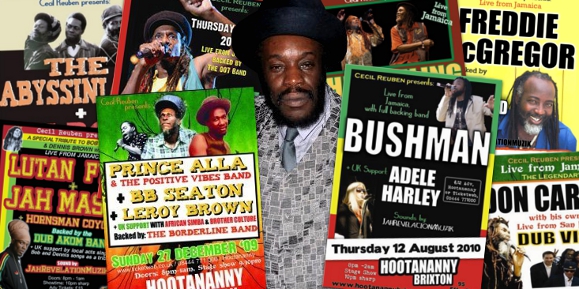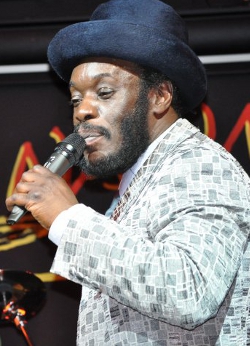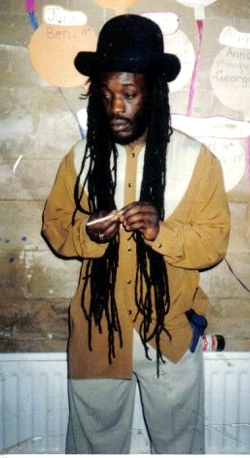Articles about reggae music, reviews, interviews, reports and more...
Interview: Cecil Reuben
- Home
- Articles
- Interviews
- Interview: Cecil Reuben

Interview: Cecil Reuben
"Brixton was the central place for reggae music but it lost its title to Harlesden. So I decided to bring back the title to Brixton"
Cecil Reuben is the promoter of reggae events at London's Brixton Hootananny, a venue that has almost single-handedly revitalised live Jamaican music in the capital. Since his arrival there the Hootananny has seen visits from artists such as Yellowman, Bushman and Don Carlos, as well as running regular nights for home-grown singing and sound system talent. Angus Taylor took a behind the scenes look at the life of the promoter as he was preparing for a busy 2011 of big name shows...

Where and when were you born?
I was born in Clarendon, Jamaica. I'm an original Clarendonian. I was born in April! (laughs)
(laughing) OK, which era of music did you grow up in?
My era was the 60s, after the ska period. When it started to turn to rockteady was when I really got into music. Around ’67-’68 time my brother used to buy a lot of records by Heptones, Alton Ellis, Phyllis Dillon, Gaylads - that was my growing up music. I just listened to what my brother used to play. What got me was the harmonies, so Heptones was my favourite group at the time. Then you had Roy Shirley - he had a big hit in '67 with Hold Them that went "Feel Good" - and a lot of Ethiopians tunes. I never really grew up on the ska - I was a bit young for that - but from the rocksteady time I started to understand the music a bit more.
 I had two loves in life - football and music. I used to play football with Bob Marley and Skill Cole
I had two loves in life - football and music. I used to play football with Bob Marley and Skill Cole
How did you get involved in the music?
I had two loves in life - football and music. So it was always going to be between football and music where my life would go. I used to play football with Bob Marley and Skill Cole who used to play for Jamaica but at the same time music started to creep in slowly. Sneaking out to dances and parties started to influence me a bit more so I started to buy records. I used to buy them down at Randy's - now VP Records - record mart on North Parade. Miss Chin the proprietor there used to always give me a good deal so I started to build my collection. We're talking early 70s - ’71-’73 - and that enticed me to rival my bigger brother's collection. He had a big collection from the rocksteady era but he stopped buying when I started and reggae - as we know it - started. You used to have labels like Impact!, Joe Gibbs, GG, Observer but in 1972 one of my biggest influences – who changed my perspective – was Big Youth coming on the scene. His LP Reggae Phenomenon influenced me to look further into Rastafari. His tune I Pray Thee was Psalm 2 – my favourite psalm in the bible.
How did you join the 12 Tribes organisation?
After I became Rasta within myself there were some brethrens I knew who were 12 Tribes. We used to sit down and reason about Rasta and they told me about a little man called Gadman and how he started the 12 Tribes Of Israel in 1968 down Davis Lane in Trenchtown. They convinced me it was the right doctrine for me and from there I became a member in about 1974-74. I’ve been a member ever since.
 Big Youth influenced me to look further into Rastafari
Big Youth influenced me to look further into Rastafari
You’ve done promotion, production and distribution but what would you say you’ve spent the most time doing over the years?
I’m a soundman originally. My sound used to play in all the 12 Tribes dances and stage shows. From 1981 I gave up playing anywhere else for 14 years and kept my sound within the organisation. I used to help with the stage shows for 12 Tribes bringing artists same way – but again it was within the organisation.  Then as you get older you leave it to the younger ones coming and get involved in your own thing. After ’94 I went back on the road for myself.
Then as you get older you leave it to the younger ones coming and get involved in your own thing. After ’94 I went back on the road for myself.
How did you come to promote at the Hootananny?
I’m a Brixtonian ever since I moved to London. Even when I’ve lived outside I’ve always been in Brixton. The Hootananny has always been here – it used to be the George Canning, then it changed to the Hobgoblin, before becoming the Hootananny. The stage used to be on the floor and it was a little hangout place where local bands used to play. When it was the Hobgoblin it had a bad reputation as a drugs den so some Scottish people came and bought it and changed the name. Then after about a year I came along and got involved and decided I wanted to run it and put on some reggae shows. I did it because this is Brixton – and Brixton was the central place for reggae music at one time but it lost its title to Harlesden where you had Jet Star and many record shops and artists. So I decided to bring back the title to Brixton and the only way was to put on some big shows at the Hootananny. The first show we put on was the Congos – which was a wicked show. Then we brought Aswad which is where it really kicked off. People thought a big band like that wouldn’t come here but I knew Aswad from when they were growing up in the ’70s. From there it was all systems go. A lot of people didn’t think we could do it because they saw it as a pub. We used to have artists saying they weren’t coming over to play in a pub. Even you in one of your articles called it a pub and I was like. “You can’t call it a pub no more – it’s a music venue!”
 I don’t put on too many bashment acts or young acts. I don’t want to bring the baggage that comes with them. I bring the foundation acts. They might be old men but they’re legends
I don’t put on too many bashment acts or young acts. I don’t want to bring the baggage that comes with them. I bring the foundation acts. They might be old men but they’re legends
What’s the secret to your success there?
Many clubs in Brixton don’t last but the Hootananny will last because I’m doing it in the right way. I have good relations with the community and the police – and we’re trying to get good relations with the licensing people. I don’t put on too many bashment acts or young acts. I’m not fighting that music or young people but I don’t want to bring the baggage that comes with them. I bring the foundation acts. They might be old men but they’re legends. Newer acts like Everton Blender and Bushman I wouldn’t call legends – they only came out the other day! – but they bring a more conscious crowd and that’s what I want. Too much hype, too much excitement and anything can kick off at any time. I’m not working with a budget like the Brixton Academy but now people have seen what we’re doing acts who have turned me down are phoning me asking to play!
A lot of these acts play regularly in Europe but before you, it was hard to get them over here.
 Roots rock reggae is more popular in Europe. In Jamaica, to my knowledge, it’s pretty much dead. The reason it does better there is because they have more festivals. Here they seem to fight festivals for some reason. I know it pees off a lot of the bands here that most of these acts want to bring a band from Europe but you can’t blame them because that’s where they’re touring.
Roots rock reggae is more popular in Europe. In Jamaica, to my knowledge, it’s pretty much dead. The reason it does better there is because they have more festivals. Here they seem to fight festivals for some reason. I know it pees off a lot of the bands here that most of these acts want to bring a band from Europe but you can’t blame them because that’s where they’re touring.
How can things improve so the UK can compete with the rest of Europe?
The roots and dub scene here is rising up good. Because of the bad elements that followed the bashment scene it’s dying out now. You get a lot of English white people and Europeans coming over and endorsing the roots scene here so it’s slowly coming back. I have a regular night on a Thursday with my sound Jah Revelation Muzik where we don’t play bashment and we get a good following. At one time in the late 80s and early 90s it was dying and all the sound systems never had work. There were no venues for them to play because venues brought in their own systems and didn’t want your big bloody speakers! Also noise reduction and licensing restrictions are stricter now. So the only place to play was outdoors – but there are no festivals! But now it’s coming back because the few little venues where you can bring a big sound – like the Scala and Tudor Rose - are being utilized a lot. I can’t bring a big sound in here – even with what we have the neighbours are going crazy! The noise metres are a disaster. People just wait for Carnival to test out their sound!
Your sons are involved in music too. Do you ever give them advice?
(laughs) Well they always followed me around and saw artists through what I do so I suppose they got influenced by that. When they were young I built a little sound called Silvereye for them to play on. Two of my sons are now engineers working in studios on computers making beats and one is a rapper. They’ve embraced the music but they’ve got their own thing happening. One is really into the roots, another loves rap and the last one plays everything. I give thanks they are in the music and not in gang activities! I always wanted to be an engineer but never got the opportunity and they know how to build and sell their music on computers so they can advise me now!
 I’d love to bring Toots here
I’d love to bring Toots here
Who is your dream artist to promote?
I’d love to bring Toots here. I’m not saying he’s my favourite artist but the Hootananny feeling is Toots and the Maytals. We do Ska on a Friday and I know Toots would go down well. Maybe I’d do more than one night!
Read comments (3)
| Posted by INGRIDYASSINE on 04.08.2011 | |
| IRIE MUCH THANKS FOR INFORMATION. BLESSED LOVE. | |
| Posted by More fire Management on 04.08.2011 | |
| Big up Cecil and Angus | |
| Posted by ReubeniteKenya on 04.03.2012 | |
| Great interview. Keep up with the good works! I like the Toots n the Maytals idea. | |
Comments actually desactivated due to too much spams
Browse by categories
Recommended Articles
Latest articles
Recently addedView all
© 2007-2026 United Reggae. All Rights Reserved. Reproduction in whole or in part is prohibited. Read about copyright
Terms of use | About us | Contact us | Authors | Newsletter | A-Z














